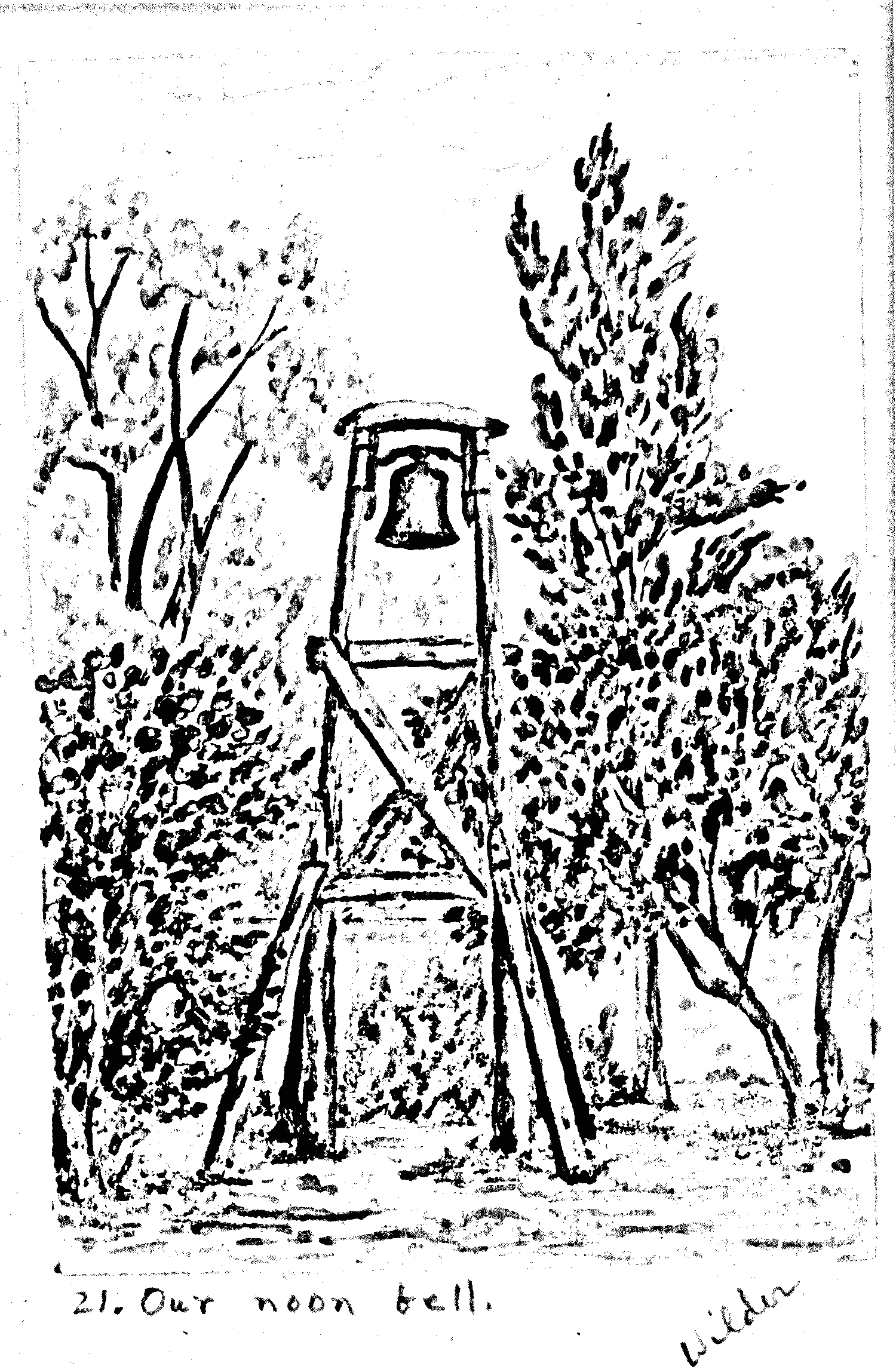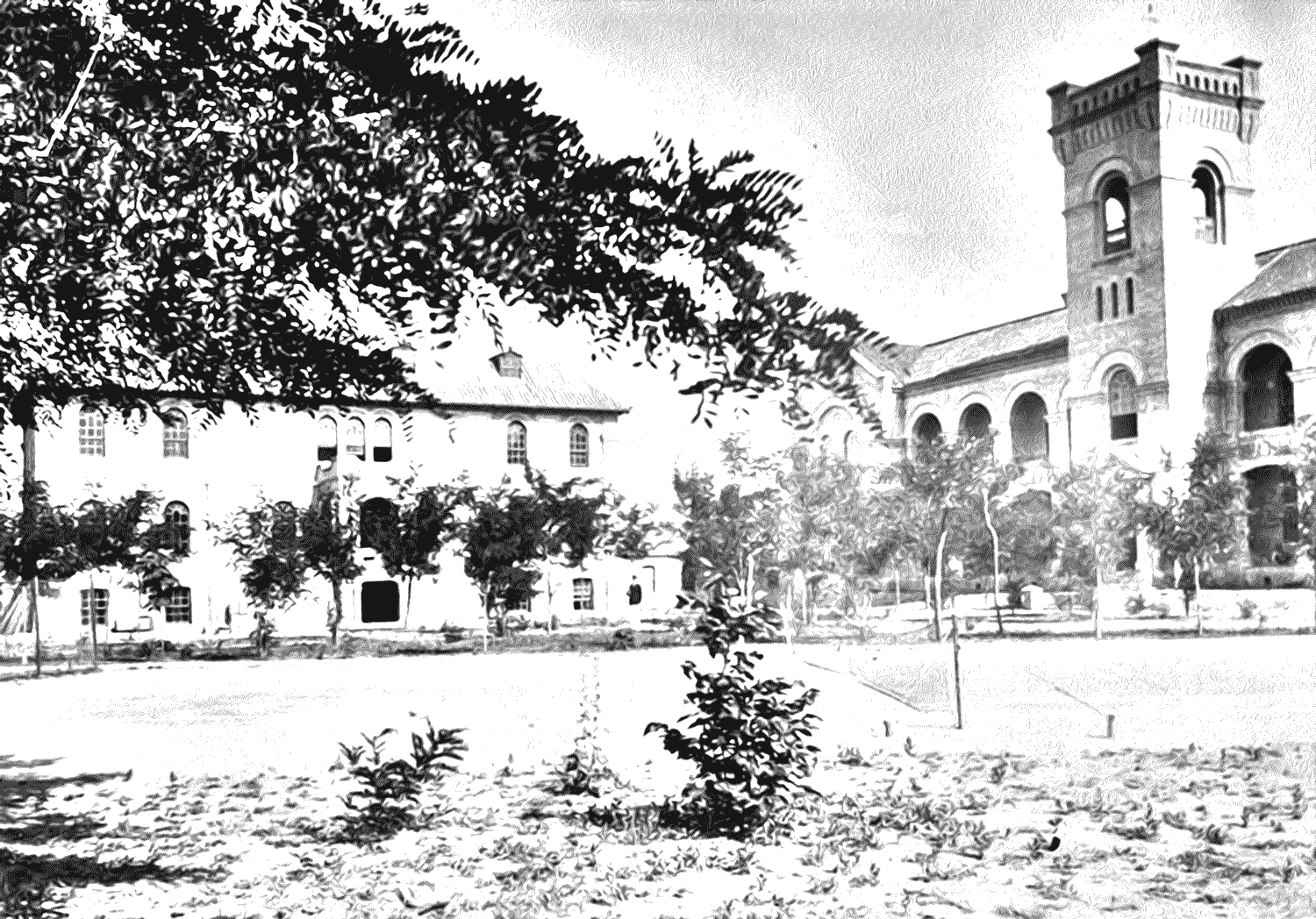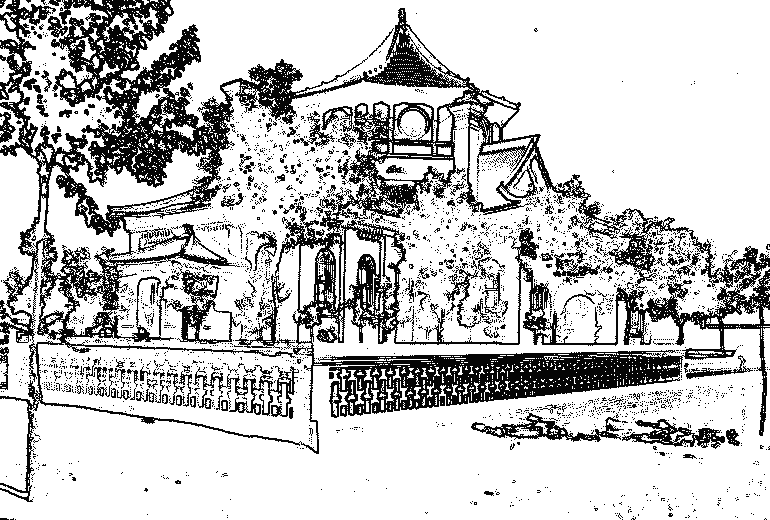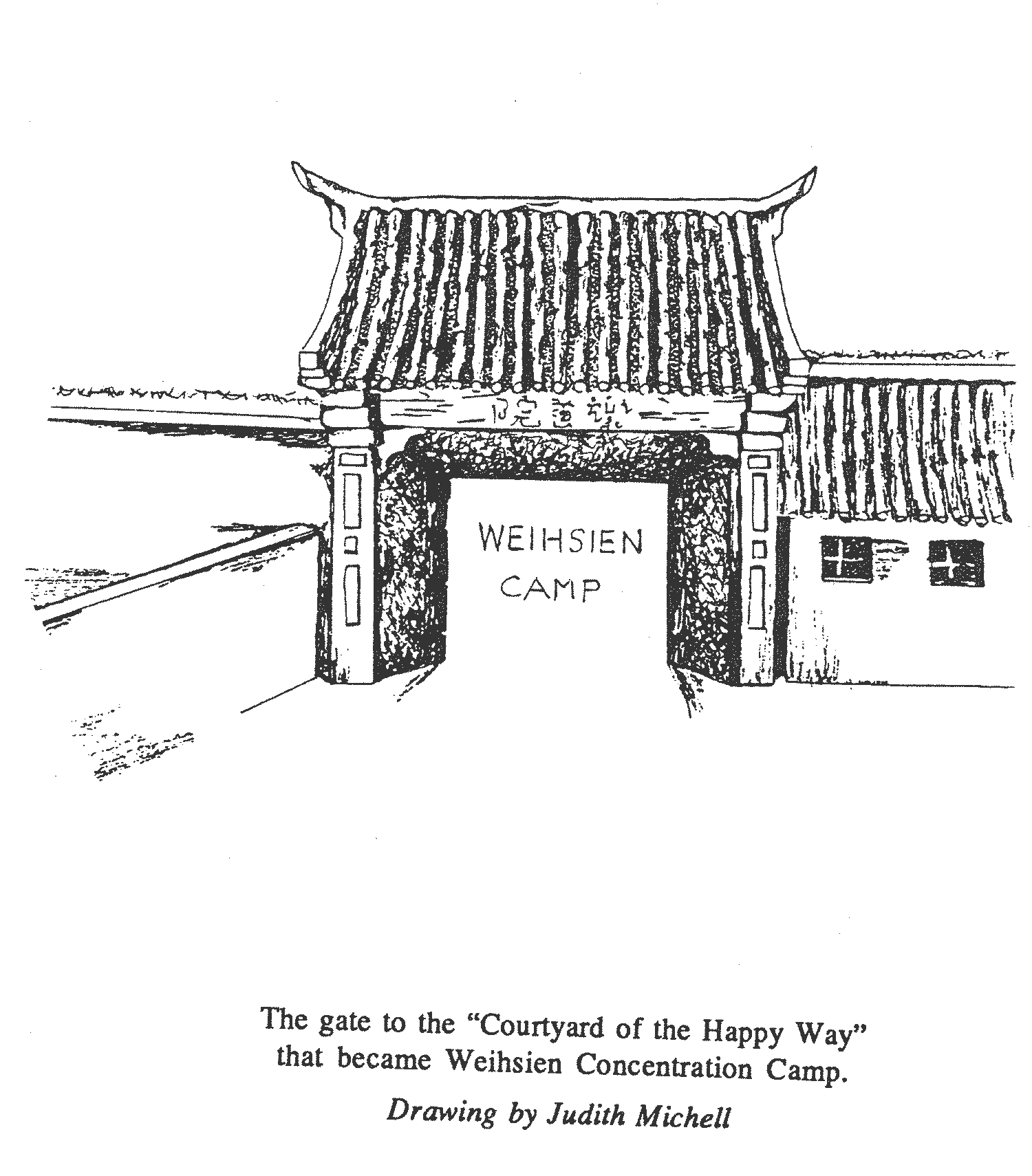
- by David Michell
[Excerpts] ...
[...]
 Part way through our ten months of internment at Temple Hill, Japanese Consular Police took over from the military authorities, and our situation improved a measure.
Part way through our ten months of internment at Temple Hill, Japanese Consular Police took over from the military authorities, and our situation improved a measure.
The new commandant, Major Kosaka, allowed sand to be brought in for us to play in. He even let us have a supply of fireworks, so that we could have our own celebrations when festivities were going on around the temple with thousands gatherings to worship the idols. The power of the big crackers really impressed us. Even a bucket thrown over one shot up as high as the top of the trees. I think I could still find the spot by the West wall where I buried one of my crackers, planning to retrieve it before I left the compound. Of course, when the day came, I forgot it in all the excitement.
[excerpt]
Roll call, morning and evening, with all of us calling out our numbers in Japanese, became part of the daily routine. Mr. Martin wrote up the numbers in Roman letters for all of us to memorize.
We were very quick learners, and those of us at the younger end of the school always ran out at the roll-call signal, to get to the front of the line.
 When the commandant in all his military braid and finery and with his attendant officers marched up, one of the soldiers with appropriate air-sucking preliminaries shouted out, “Bango,” which meant “Number off!” Away we went, as fast as we could go: “Ichi, nee, san, she, go, roku, etc.”
When the commandant in all his military braid and finery and with his attendant officers marched up, one of the soldiers with appropriate air-sucking preliminaries shouted out, “Bango,” which meant “Number off!” Away we went, as fast as we could go: “Ichi, nee, san, she, go, roku, etc.”
The first four in the line-up could play a joke with the numbers. Instead of counting “Ichi, nee, san, she,” we would sometimes say, “Itchy knee, scratch a flea.” It gave us all a laugh, and since we said it so quickly, I don’t think the Japanese knew what we were up to.
[excerpt] by Evelyn Davey
The boys have a new craze playing with buttons and string. The result is that Bea collected 26 buttons they had pulled off their clothes!
Bruce Keeble hadn’t got one left on his coat.
[excerpt] by Evelyn Davey
Now the cold weather is here and the fun has really started. I was on duty on a cold, wet, sleety day! The children had to play indoors — in their dorms and the hall. It was SOME squash!
I wandered around stoking stoves, answering questions, quelling quarrels, finding paper, pencil, glue, string, etc. “raving” at people for walking on the beds, and emptying “chambers”! They could not go to the outside lavatories because of the snow — so I was kept busy. To crown all, the electric lights failed to come on, so we had to go to bed by candlelight. I had just escorted eight little girls into the bathroom to wash, holding a very wobbly candle, when the candle overbalanced, fell behind the geyser, and left us in complete darkness. I took a step forward to find it — and knocked over a jug of cold water which swamped the floor! Oh dear! Poor Teacher on Duty! However, the day ended at last!
 [excerpt]
[excerpt]
Second helpings of anything were very rare. When one five-year-old discovered that she was allowed a second drink of water at playtime, she shouted excitedly to the others,
“Hey, everybody, seconds on water!”
[excerpt]
Following the ringing of the camp bell each morning was the daily roll call in six areas of the camp. It was always a tedious procedure, but thankfully did not always last five and a half hours as happened the first time. The older people were allowed stools or deck chairs, and we children were able to play marbles once we had been counted.
We learned how to play “luncre” from the Peking and Tientsin Grammar School children.
To the teachers’ dismay and our discomfort, we learned more than the game of marbles. The teachers were shocked to hear us describe with great animation our latest exploits with the best “damn-crack” marbles in Weihsien Camp. We had added to our vocabulary swear words that didn’t exist in our world in Chefoo School, though some boys seemed to have quite a penchant for remembering Chinese swear-words.
Unfortunately, most of us lost the Chinese language we should have remembered, having learned to speak it quite fluently from Chinese playmates before we left home. At school we were not permitted to use Chinese, as a number of our teachers did not understand it.
 [excerpt]
[excerpt]
The priest was always one step ahead of the Japanese, and even in solitary, he put one over on them.
After about a week, Scanlan was lonely for company. He decided to sing his prayers out loud in Latin, late at night.
Since his cell was in one of the buildings housing the soldiers, his booming voice was keeping them from sleep. On hearing that these noisy activities were his obligatory religious exercises, they hesitated to interfere. They put up with the same routine one more night and then gladly sent him back to us. As Weihsien’s egg hero was marched back into camp under guard, the Salvation Army band fell in behind them, playing a march and soon a long train of grateful mothers and children were part of the joyful procession.
The Japanese appeared not to get the point as the camp feted its benefactor’s return.
 [excerpt]
[excerpt]
Not long after we had moved to Weihsien, another boy and I were playing a game of “conkers” with an acorn suspended on a piece of string.
My new-found friend looked up and said, “Do you know who that is coming up the camp road?”
[excerpt]
As chairman of the recreation committee, he helped organize the athletic events and worked with our teachers in arranging sports days. I remember him as umpire of our soccer games, which we used to play barefoot on the athletic field by the church.
He tore up the sheets he had brought into camp so that he could bind up the field-hockey sticks. In short, he always inspired enthusiasm as he found ways to keep the sports side of camp life going. Strong as he was in his conviction about Sunday not being a day for sports, he even agreed to referee the games of some of the children whose parents let them play on Sundays, when he found them fighting over the game.
To all of us young people in camp, he was known as Uncle Eric.
To us he stood out as kind and friendly, with his ever-present smile and gentle, Christ-like manner. He was a true Christian gentleman. He loved children and gave a lot of time to those of us in the Prep School because we were the youngest without our parents.
As someone said, he had a Pied-Piper-of-Hamelin quality about him.
[excerpt]
Our conversation that day went back to the times when as boys we played marbles together in the dirt of Weihsien.
We remembered those marbles matches which had helped us while away the waiting hours of the daily roll call, only to come to an abrupt end as angry boots appeared in front of our noses and our eyes followed them up into the glowering faces of the Japanese guards.
[further reading]
http://www.weihsien-paintings.org/books/aBoysWar/ABoysWar(LaTotale)-pages.pdf
#













